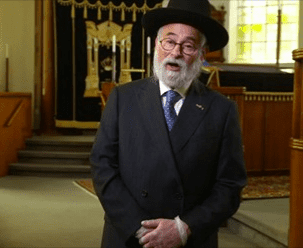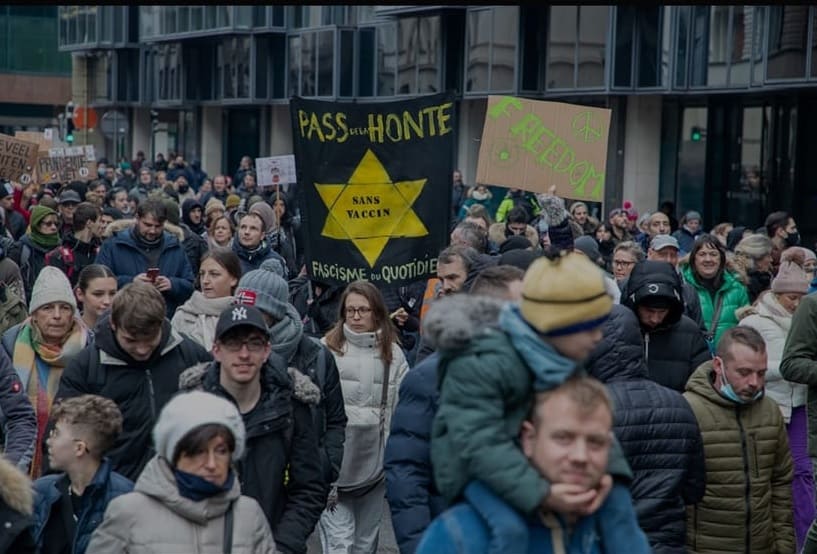Every Day during the Corona crisis our Advisory Board Member Chief Rabbi Jacobs (NL) writes a diary, on request of the Jewish Cultural Quarter in Amsterdam, which is published on the website of the NIW, the only Jewish Dutch Magazine. Rabbi Jacobs is the head of Inter Governmental Relationships at the Rabbinical Centre of Europe. We will be regularly publishing a selection of his informative, sometimes light hearted, but always wise pieces.
Here, the Rabbi offers his unique and refreshing take on the portion. For our Dutch readers you can follow the diary every day at NIW home page: https://niw.nl and then: scroll down.
On Freedom of Speech
Freedom of opinion and speech is a great asset and therefore everything must be said.
And if I am allowed to say everything, I also have to accept everything and not moan when I myself become the target of taunts. Agree!
But why then get upset about anti-Israel resolutions in the UN, the anti-Semitic floats in Aalst or the umpteenth anti-Semitic cartoon in the Volkskrant?
Everything can be said, right? A cartoon that insults the heart of Islam must be possible, right? And what’s wrong with black Pete? Do dark skinned people feel offended? Don’t complain, freedom of speech!
But that opinion should of course not be every opinion, because if parents want to teach their children that the family with a mom and dad is the cornerstone of society, it could be seen as discriminating towards people who have a different orientation…
A befriended non-Jewish, non-Christian, non-Muslim and unmarried journalist (thus of impeccable behaviour!) Has warned me not to write that I am in favour of freedom of expression, but that that freedom must have restrictions.
That nuancing “but” would bring a torrent of criticism on myself. “But” I don’t get that, because if freedom of speech is to be cherished, then I am allowed to express my opinion, even if that opinion differs?
And so with this my opinion, straight from ancient Judaism (Proverbs of the Fathers 2: 1): “What is the right way that man must choose? Any way that gives honour to him who follows him and by which he is honoured by men. ”
In other words: Black Pete really had nothing to do with discrimination for me. But if normal thinking people with a black skin colour now experience this as discriminating, then we have to stop.
Fanaticism is no good, neither from the right nor from the left, not from religion, but also not from secularization. Because secularization can also be fanatic, compulsive and intolerant.
But just before writing this, I got a call from a secular mayor friend: “Binyomin, if you ever need to, you can count on me.” This again shows: friendship and solidarity, between secular and religious, standing up for each other, that is not only possible but eminently desirable.
Freedom of opinion and speech is a great asset and therefore everything must be said.
And if I am allowed to say everything, I also have to accept everything and not moan when I myself become the target of taunts. Agree!
But why then get upset about anti-Israel resolutions in the UN, the anti-Semitic floats in Aalst or the umpteenth anti-Semitic cartoon in the Volkskrant?
Everything can be said, right? A cartoon that insults the heart of Islam must be possible, right? And what’s wrong with black Pete? Do dark skinned people feel offended? Don’t complain, freedom of speech!
But that opinion should of course not be every opinion, because if parents want to teach their children that the family with a mom and dad is the cornerstone of society, it could be seen as discriminating towards people who have a different orientation…
A befriended non-Jewish, non-Christian, non-Muslim and unmarried journalist (thus of impeccable behaviour!) Has warned me not to write that I am in favour of freedom of expression, but that that freedom must have restrictions.
That nuancing “but” would bring a torrent of criticism on myself. “But” I don’t get that, because if freedom of speech is to be cherished, then I am allowed to express my opinion, even if that opinion differs?
And so with this my opinion, straight from ancient Judaism (Proverbs of the Fathers 2: 1): “What is the right way that man must choose? Any way that gives honour to him who follows him and by which he is honoured by men. ”
In other words: Black Pete really had nothing to do with discrimination for me. But if normal thinking people with a black skin colour now experience this as discriminating, then we have to stop.
Fanaticism is no good, neither from the right nor from the left, not from religion, but also not from secularization. Because secularization can also be fanatic, compulsive and intolerant.
But just before writing this, I got a call from a secular mayor friend: “Binyomin, if you ever need to, you can count on me.” This again shows: friendship and solidarity, between secular and religious, standing up for each other, that is not only possible but eminently desirable.















